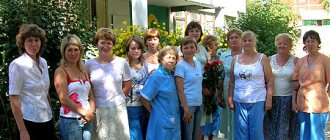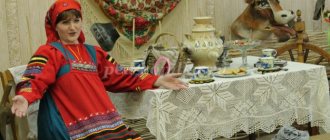Methodological development of a class hour on the topic “Do good”
This class hour will help each participant look into their heart so that it becomes open and kind. Kindness can be shown into the world in different ways: doing a kind deed, smiling a kind smile, saying a kind word.
Goals and objectives: (1 slide)
- Discuss with students the concepts of “goodness” and “kindness”.
- To form in students goodwill, responsiveness, kindness and mercy, tolerance.
- Instill the basics of moral behavior.
Form of conduct: conversation.
Progress of the class hour:
Good afternoon. When we say these words, we sincerely wish those we meet goodness, peace and joy. And our heart opens to sincere and kind people.
I want to start today's class hour with an epigraph: (2 slide)
Do Good
“Regardless of whether they expect good from you or not, do good. Regardless of whether your goodness is noticed or not, do good. Do good and don’t ask anyone’s permission, For no one has power over your good.”
Shalva Amonashvili
This class hour will help each participant look into their heart so that it becomes open and kind.
Kindness can be shown into the world in different ways: doing a kind deed, smiling a kind smile, saying a kind word.
Let's try to answer two important questions for us:
1. What is kindness
2. Why is it so important for a person to learn to do Good?
The word "kindness". It seems like a very common word. Let's try to define it
Students.
Kindness is the expression of sincere, good feelings towards someone or something.
Kindness is when you do something to people that makes them happy and you do it sincerely and from the bottom of your heart!
Kindness is the ability to sympathize and have compassion for people, to see only the good and bright side in a person’s personality.
(3rd slide) Kindness - responsiveness, sympathy, friendly disposition towards people, everything positive, good and useful.
What does it mean to be kind? What kind of person is called kind?
- To be kind means to sacrifice one's interests for the well-being of another.
“Being kind means sharing the last thing you have.”
A good person is one who:
- loves people nature
- ready to help them in difficult times
- Polite in communication, respectful towards adults and younger people
- who thinks not only about himself, but also about others.
(4 Slides):
A kind person means one who treats people with goodwill, is imbued with sympathy for them, and is ready to help. A good person notices first of all the good in others, an evil person notices the bad.
I'll read the parable.
Think about what the sage could answer to his student. Why?
A sage and a disciple are sitting at the gates of their city. A traveler comes up and asks: “What kind of people live in this city?” “Who lives where you came from?” - asks the sage. “Oh, rude, evil, unkind people,” the traveler replies. “You will see the same thing here,” answered the sage. After some time, another traveler came up and also asked what kind of people were in this city. “Who lives where you came from?” - asked the sage. “Wonderful people, kind and sympathetic,” answered the traveler. “Here you will find the same ones,” said the sage. “Why did you tell one that bad people live here, and the other - good people?” - the student asked the sage. The sage replied: “There are good people and bad people everywhere. It’s just that everyone finds only what they know how to look for.”
What kind of person does kindness make?
Students
- Charming, handsome. A person who has kindness in his soul looks pleasant, has an expression of joy and peace on his face and a smile on his lips.
What kindness rules do you think you need to follow to be kind?
- Be kind to your neighbor and goodness will return to you.
- Help the weak.
- Know how to forgive.
- Learn not only to speak, but also to listen. Be attentive to those around you: maybe someone needs your help, support, sympathy.
- Live and act in such a way that those around you feel pleasant and joyful around you.
How does kindness manifest itself in a person?
- by his actions.
Cl. leader: Indeed, according to the statement of Wladyslaw Grzeszczyk, “Good exists where it is constantly created,” one of the slogans of the scouting movement was “Not a single day without a good deed!”
Name the simplest, in your opinion, good deeds.
— Hold the door for someone, give up your seat on public transport.
- Give compliments, treat someone, let a person pass in line if he is in a hurry.
(5 slide) - Try to do pleasant little things for others as often as possible and you will see how the world around you and your mood will improve.
Here are some examples of good deeds for every day:
- Feed a homeless animal.
- Give good advice to someone who needs it.
- Send your friend a postcard with kind words.
- Give your neighbor an indoor flower.
(6 slide) This is the parting word given by Anton Pavlovich Chekhov: “Don’t calm down, don’t let yourself be lulled to sleep! While you are young, strong, vigorous, do not get tired of doing good.”
— I suggest you listen to a parable about kindness and mercy and answer the question: can this action be called good?
We were in the hospital in the same ward. Two seriously ill people. One lay by the window, and the other by the door, where there was no light. One was constantly looking out the window, The other was just looking at the paint on the door, And the one at the door wanted to know About the other life outside the window. The first patient readily told what he could see from the window: “There is a quiet river, a boardwalk pier, and a cat walks along the bank. Clouds float across the blue sky, whimsical, like little animals. There are two fishermen sitting on the pier, and an old woman is walking with her grandson.” And so every day. Sometimes he talked about a fairytale forest, sometimes about lovers. Another neighbor stopped even eating, Considering himself deprived. He was tormented by anger, and envy grew, gradually eating him up. He could not understand why there was such injustice here. One day, a neighbor at the window fell ill, so he didn’t have the strength to straighten up. He began to choke and couldn’t even reach his button. At the door, the neighbor could have pressed the button and called the sister of mercy, but he did not press and remained lying, closing his eyes diligently. In the morning, the sister of mercy came to change the bed for the deceased. The neighbor asked, and she helped, to occupy this very bed. When he finally looked out the window, a vein twitched in his neck. Instead of what he wanted, he saw a blank high wall. He was shocked and told his sister about the quiet, clean river, about the fairy-tale forest, about the plank pier and the sky in curly sheep. “Oh, if only he could see! - said the sister. “He remained blind all his life.” “Why then?..” - here the patient whispered... “Yes, he tried to console you.
Discussion
- What is a good deed?
— Should consolation be treated as kindness, why?
- Could you do this?
(7 slide) — Kindness, mercy, joy and concern for others create the basis of human happiness.
Remember that kindness and mercy have been developed by humanity over the centuries in order to make it easier for everyone to live, to communicate with each other, so that this communication brings joy. Each of us needs to live like this.
“Doing good for people means making yourself look good” L. Tatyanitseva
— How do you understand the phrase “become good yourself?” Does this mean that you have to be a good person, do what people like?
(8 slide) Do good - There is no greater joy, And sacrifice your life And hurry
Not for the sake of fame or sweets, but at the behest of the soul.
What proverbs and sayings about goodness do you know?
• A good word heals, an evil word cripples.
• The evil one does not believe that there is a good one.
• Good fame lies, but bad fame flees.
• The good are honored, and the evil are favored.
What does folk wisdom say about kindness?
Who loves good deeds, life is sweet to him.
A good person lives in goodness forever.
What you cannot do by force, you will achieve with kindness.
A hundred hands for a good man.
The good die, but their deeds live.
How do you understand the words: “Goodness must come with fists”?
Goodness must be with fists, Goodness must be stern, So that wool flies in clumps From everyone who interferes with goodness. Good is not pity or weakness, Good breaks the locks of shackles.
Good must be strong and active. Kindness is a sign of strength, not weakness. A strong person shows generosity, he is truly kind, but a weak person is kind only in words and inactive in actions. (9 slide)
Great writers have always spoken about kindness. (Slide 10) Which statement do you consider important for yourself, explain your choice.
Nothing costs us so little or is valued so dearly as politeness and kindness. (Miguel Cervantes)
True kindness lies in treating people kindly. (Jean Jacques Rousseau)
To appreciate kindness in a person, you need to have a certain amount of this quality in yourself. (William Shakespeare)
The smarter and kinder a person is, the more he notices goodness in people. (Blaise Pascal)
Kindness is something that the deaf can hear and the blind can see. (Mark Twain)
A lot of poems have been written about kindness. Maybe someone will read these verses, and we will listen with pleasure.
(students read poetry)….
KINDNESS WILL SURELY SAVE THE WHOLE WORLD
Kindness will certainly save the whole world Helps everyone in the world to grow In order for people to find harmony and peace You warm your heart in kindness Mercy suddenly kindled in your heart And it spread without a doubt Everyone will know it if it even lit up in your heart for a moment A lot of strength and diligence is needed invest So that Goodness and Patience are preserved The only Truth is to preserve Truth, Kindness and Patience in your heart.
Event for younger schoolchildren about kindness
Educational event for elementary school students “He who does good creates life”
Description of the material . I present to your attention the scenario of the educational event “He who does good creates life.” This event is aimed at fostering moral feelings such as kindness, responsiveness, sincerity, and selflessness. The event is filled with a variety of didactic material, which allows you to learn new things in a playful way, and this has a positive effect on the cognitive interest and creative activity of students. * * * Kindness. What an old word! Not for centuries, but for millennia, people have been arguing about whether it is necessary or not, whether it is useful or harmful. Disputes rage, and people suffer from the lack of kindness in their lives. Look around, take a closer look at how unfriendly and indifferent people can sometimes be towards each other. - Good morning! Good afternoon We pronounce these words every day, wishing those to whom we address goodness and joy. — Today we have an unusual activity. Today we have a Kindness Activity! -What is good? Today we will try to answer this question. You can live in different ways in life - You can be in trouble, or you can be in joy, Eat on time, drink on time, Do pranks on time, Or you can do this: Get up at dawn - And, thinking about a miracle, Take out the sun with a burnt hand And give it to people . (S. Ostrovoy) - Now listen to the song from the cartoon “Leopold the Cat” - “If you are kind!” (song discussion) - Why is it good and easy if you are kind??? And why is it bad if it’s the other way around!? — Guys, think and answer, with what words do you associate the word “Good”, what immediately comes to mind? (children’s answers) (write down on a piece of paper the words with which the children associate the word “Good”, “kindness”). - So, what is good? How do you understand the meaning of this word? — in Sergei Ivanovich Ozhegov’s dictionary the word “kindness” is defined as follows: “Kindness is responsiveness, emotional disposition towards people, the desire to do good to others.” — I suggest you guys listen to one story by V.A. Sukhomlinsky, “An Ordinary Man.” V.A. Sukhomlinsky ORDINARY PERSON There is a well in the hot, dry steppe. Near the well there is a hut where a grandfather and grandson live. There is a bucket on a long rope near the well. People are walking and driving - they turn to the well, drink water, thank their grandfather. One day the bucket came off and fell into a deep well. Grandfather didn’t have another bucket. There is no way to get water and drink. The next day, in the morning, a man in a cart drives up to his grandfather’s hut. He has a bucket under the straw. The traveler looked at the well, glanced at the grandfather and grandson, hit the horses with his whip and rode on. -What kind of person is this? – the grandson asked his grandfather. “This is not a person,” answered the grandfather. At noon, another owner drove past his grandfather's hut. He took a bucket from under the straw, tied it to a rope, took out water and drank himself, and gave it to his grandfather and grandson to drink; poured the water into the dry sand, hid the bucket again in the straw and drove off. -What kind of person is this? – the grandson asked his grandfather. “And this is not a person yet,” answered the grandfather. In the evening, a third traveler stopped at his grandfather’s hut. He took a bucket from the cart, tied it to a rope, filled it with water, and drank. He thanked him and drove off, leaving the bucket tied at the well. - What kind of person is this? - asked the grandson. “An ordinary person,” answered the grandfather. Can we say that grandfather and grandson are kind people? Why? About one of the people passing by, the grandfather said that “this is not a person.” Why? Why did the grandfather call the third person passing by an ordinary person? What other person can you call him? - How often in life are we like those people who did not help the old man and grandfather, we are absolute about what is happening and think only about ourselves?! And if every person on the entire globe began to notice some little things (and life is made up of little things), which can somehow influence other people, improve their mood, how much kinder, sympathetic people there would become! After all, it costs nothing to say a kind word, a compliment, or give a smile to a person! Let's try to start doing at least one good deed every day in our lives, even the smallest one. You can help your friend, comrade, classmate, help an elderly person cross the road, if only you wish! Imagine how much the world will change then! - How to become kind? After all, it doesn’t happen like this: in the evening you went to bed an angry person, and in the morning you suddenly became a kind person. Is it easy to be kind? Yes, being kind is not easy, but it is important. To make this task a little easier, let's try to formulate the rules of Kindness. (work in groups, discussion) 1. Do good deeds just like that, with good intentions. 2. Encourage others to have good relationships 3. Do good for loved ones and friends 4. Don’t envy 5. Don’t be harmful 6. Don’t be rude - Now we can formulate the “Laws of Kindness” • Treat people the way you would like to be treated you! • It’s better to give what’s yours than to take someone else’s! • Know how to give joy to people! • Don't upset your loved ones! • Be afraid to offend a person! • Love and forgive people! • Do good! KTD "Tree of Good Deeds". - Before us is a tree, which now has only a trunk and branches without leaves, and small hearts symbolize the good deeds that you have done in your life. Remember and tell us about your good deeds. As a result, as many hearts will appear on the tree as there are good deeds you name. And now, while you are thinking, listen to the poem: - Good people, as always, are in short supply, Good people, as always, are in short supply. Kind people are not always understood; the hearts of the kind hurt more. The kind ones generously help the sick, give warmth and comfort, The kind ones walk in step with the weak and don’t expect any thanks! (children talk about good deeds and attach a heart to a tree) - Kindness has been spoken about at all times in poems and songs, in sayings and proverbs, and now, we will remember some of these proverbs. In front of you in the first column is only the first part of the proverbs, and you need to select the second part from the second column. Life is given with good, they pay with kindness; evil is remembered to him; evil does not harm; goodness, to do a good deed, will not be forgotten; for good, forget evil; the shirt wears out, but for good deeds, he who does good, does no good to anyone; remember, but to amuse yourself; goodness is worth more than wealth; it is bad for him who long A good deed throughout the world is quiet Answers: 1. Life is given for good deeds. 2. Kindness is remembered for a long time. 3. Do good things - make yourself happy. 4. They pay for good with good. 5. The shirt will wear out, but the good deed will not be forgotten. 6. Remember good, but forget evil. 7. Goodness walks quietly through the world. 8. It is bad for him who does no good to anyone. 9. A good deed is more valuable than wealth. (reading and explanation of proverbs) Game: “Is a fairy-tale hero good or evil?” - You all love fairy tales. One of the main themes of Russian fairy tales was the theme of good and evil. In fairy tales there are good and evil heroes. Now let's play a game. I will name the fairy-tale hero, and you will answer whether he is good or evil. If you are kind, you joyfully clap your hands; if you are evil, you cover your face with your palms. Ivan the Tsarevich, Thumbelina, Karabas-Barabas, Little Red Riding Hood, Baba Yaga, Cinderella, Malvina, Koschey the Immortal, Pinocchio, Elena the Beautiful, Gray Wolf, Carlson... - Tell me, why does every person need kindness? -What should we be? What to strive for? Tell me guys, you love the sun. Let's make the sun shine bright and bright on this earth. For this I prepared this sun, but what is missing from it? (Luchikov) - Correct. It is no coincidence that folk wisdom says: Kindness is like the sun. Kind people, like the rays of this sun, warm people with their kindness. In front of you are rays of the sun, on which the qualities of a person are written, we need to choose only those that a good person should have, let's try! • neat • friendly • polite • rude • knows how to forgive insults • sensitive • sympathetic • helps in trouble • often quarrels • hot-tempered • sociable • affectionate • cheerful • happy • arrogant • attentive • greedy • loud (Children read the quality, decide it belongs here or not and attach it to the sun like a ray). This is what the famous Georgian teacher Shalva Aleksandrovich Amonashvili said: Regardless of whether they expect good from you or do not expect it - Do Good, Regardless of whether they accept your good or reject it - Do Good, Regardless of how they will pay you for good : good or evil - Do Good. Do Good and don’t ask anyone for permission. Being kind is both easy and not at all easy. Unfortunately, we do not always treat each other with attention. Each of us has our own strengths and weaknesses. And I offer you basic rules that will be useful in life to remain kind, caring, polite, and attentive to the people around you. (Children read in chorus from the board): • Don’t be afraid to offer help to others, help first of all people in trouble, the weak, the sick. • Do not interfere with the people around you from working and relaxing. • Be polite, kind, considerate of others, and show respect to elders. • Be tolerant of other people, but do not in any way accept their wrong behavior. - Guys, what did we talk about today? — What conclusions will you draw for yourself? — What did you like most about our lesson? What didn't you like? - Now clap for those who liked the whole lesson! And now everyone will wave at me. Say loudly: “Be kind!” When you are surrounded by many friends, life is easier, better, more fun for everyone. Pass on the good things around to your parents, acquaintances, and friends. And everything will come back to you in full. Well, now a loud “Hurray!” Good morning! See you! (song “On the Road of Good” sounds, photograph for memory)
We recommend watching:
Educational event on traffic rules, 2nd grade Educational event in elementary school. Abstract Lesson for children from an orphanage. Topic: “My future family”
Similar articles:
Summary of an educational event in elementary school on the topic “When a prank becomes an offense”
Summing up the class hour
The main purpose of man is to do good. (Slide 11)
The old alphabet seemed to call: - People of the Earth, Think and do Good! Remember this call, guys, always follow it. Treat people the way you want them to treat you. Learn to understand people who feel insecure. Help them, support them. Befriend someone who feels awkward around their peers and give them a chance to gain confidence.
Conclusion: Kindness, wisdom, mercy, justice, hard work, humanity, responsiveness, and sincerity create the basis of human happiness.
Don’t hide your kindness, Open your heart to everyone. Share more generously with what you have, open your soul. Give only warmth: To a child, a woman and a friend, And push away the emptiness. Life will return everything in full circle. (12 slide)
• Kind words are roots • Good thoughts are flowers • Good deeds are fruits • Kind hearts are gardens. (13 slide)
Take care of your garden and do not let it become overgrown with weeds, fill it with sunshine, kind words and good deeds.
And at the end of the class hour, let's listen to the song “About Kindness” and look at a photo of our group.
(Slide 15) “Where there is friendship, goodness lives there!”
Let's try to find out a little about ourselves with the help of a test. Remember that you must answer sincerely.





